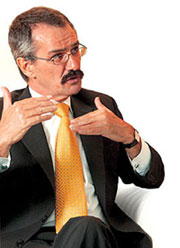 |
This
2003-04 Annual Report is the tenth report on the Hong Kong
Institute of Education. Instead of inviting the President
to write an Overview, an interview with the President was
considered an effective way of informing stakeholders of
the achievements and challenges of this important year in
our development. One sunny afternoon, a meeting between
the President and the editorial team was therefore arranged
in the tranquil setting of the Institute Lodge. The key
points of the in-depth discussion which ensued have been
captured in the Dialogue with the President. |
 |
How would you describe
2003-04 in the history of the Institute? |
 |
It has been
a landmark year in our development.
Not only are we celebrating our 10th birthday in 2004, we
also achieved a major breakthrough with the attainment of
self-accrediting status during the year. This achievement
highlights three critical milestones in HKIEd's development:
- we are now "recognised"
for having the processes in place to develop our own
programmes ;
- being "independent"
means that we no longer need to ask a third party to
accredit our programmes ;
- we have become "mature"
enough to confer our own degrees - the very essence
of a university-level institution.
An added benefit
is that with self-accrediting status, we are now able to
respond more rapidly to the needs of schools, the students
and the community. Teaching staff, instead of being burdened
by validation-related administrative work, can now concentrate
on teaching and applied research - our core activities.
In the long term, this benefit will have a powerful and
positive impact on the support we can give our students. |
| |
|
 |
2003-04 has also been
a tough year for HKIEd in terms of resource support. How
has the Institute handled the problem and how effective
were these measures? |
 |
The challenges
faced in 2003-04 were unprecedented. We were told that there
would be a 20 percent reduction in government funding in
2004-05, including the withdrawal of the front-end loading
provided to new institutions during their developmental
stages. This poses tremendous challenges and we need to
move forward carefully to ensure that we continue to improve
and achieve our goals in an environment of reduced resources.
Measures introduced included a Voluntary Departure Scheme
for non-academic staff, the outsourcing of various services,
process re-engineering, as well as consolidation of our
organisational structure to cut back on expenditure and
focus our resources on our core activities - quality teaching
and learning.
The execution of these cost-saving measures would not have
been achievable without the full understanding of our staff.
During the process, we made every effort to communicate
frankly with staff, keeping them fully informed of the situation
that we were facing. Reaping the benefits of these actions,
we were able to achieve a 20 percent reduction in non-academic
staff expenditure, enabling us to better face the difficult
environment ahead.
Looking forward, a major task we will have to confront is
the de-linking of our salary scales from that of the civil
service. Building on our past experience, the exercise will
be conducted seriously and responsibly with internal and
external benchmarking as well as the appropriate consultation
to ensure that our salary packages remain competitive. |
| |
|


